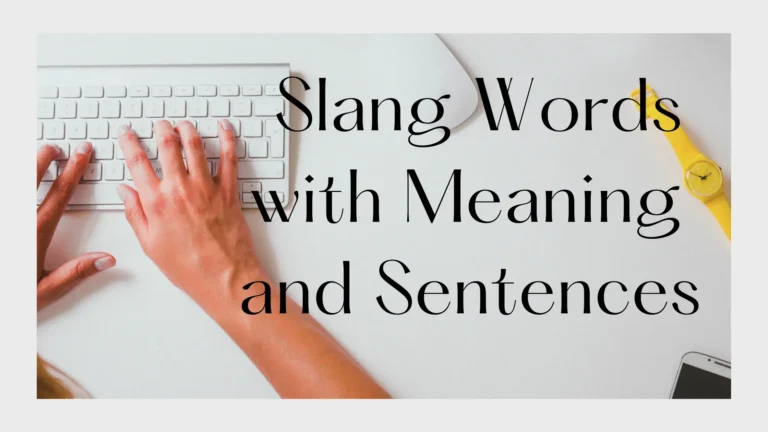5 English slang terms you need to know in 2024
Slang is one of the most fascinating parts of any language.
These informal words and phrases provide color, humor, and a window into the cultures that create them.
If you’re learning English or simply want to understand the casual conversations happening around you, getting familiar with some common slang terms is a must.
Today, we’re diving into the meanings behind 5 extremely popular English slang expressions. Let’s get this party started, shall we?
1. “Lit”
Definition: Amazing, exciting, extremely fun
You might hear someone describe a concert, party, or just a really good day as being “lit.”
It basically means it was an incredibly fun, hype, and memorable experience.
Examples:
“That party last night was absolutely lit!”
“This new video game is so lit, I can’t stop playing.”
“We had such a lit time on our trip to Vegas.”
At its core, saying something is “lit” is the slang way to convey that it’s exciting, amazing, and thrilling in the best way possible.
2. “Extra”
Definition: Over the top, unnecessary, too much
If someone’s behavior is labeled as “extra,” it implies that they are being over-the-top, dramatic, or doing too much in a particular situation.
It’s a way to call them out for unnecessary embellishment or theatrics.
Examples:
“Jess is so extra sometimes, she threw a fit over a tiny problem.”
“He was acting extra by wearing that ridiculously flashy outfit.”
“I’m not trying to be extra, but I just felt our waiter was a little rude.”
The term calls out inappropriate excess, whether in words, actions, or style choices. It’s asking the person to tone it down a notch.
3. “Salty”
Definition: Bitter, upset, angry (often about being treated unfairly)
When someone is “salty,” it means they are bitter, resentful, and upset—often feeling wronged in some way.
The term likens their emotional state to the sharp, unpleasant flavor of salt.
Examples:
“Don’t be so salty, it was just a game.”
“She’s still salty about not getting the promotion at work.”
“My brother is salty that I got better grades than him in school.”
If someone calls you “salty,” they’re implying you’re holding onto anger and resentment in an unconstructive way.
It’s time to let the grudge go and move on.
4. “Throwing Shade”
Definition: Making an indirect insulting comment or gesture
To “throw shade” means to subtly criticize, dismiss or disrespect someone in a very indirect manner.
It’s a way of covertly expressing disapproval without an outright insult.
Examples:
“Did you see the way she threw shade at my new haircut?”
“Don’t throw shade just because I have a different opinion.”
“They were totally throwing shade at us with those rude comments.”
When you throw shade, you’re implying criticism in an underhanded, ambiguous way instead of addressing it directly.
Whether through a side-eye glance or backhanded compliment, the message of disdain is clear.
5. “Ghosting”
Definition: Suddenly ending all communication without explanation
In the modern digital age, “ghosting” has become incredibly common.
It refers to abruptly cutting off all contact and communication with someone without any warning or explanation for ending the relationship (romantic or otherwise).
Examples:
“My date ghosted me after we went out a few times.”
“I ghosted that toxic friend group and feel so much better now.”
“If a company ghosts you after a job interview, they’re not professional.”
Rather than have an awkward conversation about ending things, ghosting is the cowardly way out.
One person simply goes radio silent, leaving the other person confused and hurt by the abrupt disappearing act.
While ghosting seems to have become normalized in today’s fast-paced society, it’s still considered rude and inconsiderate behavior by most.
An upfront person would ideally communicate their desire to end the relationship, even if the conversation is difficult.
Making Sense of Slang
We’ve covered five very common slang terms used in modern English conversations:
“Lit” – Amazing, super fun and exciting
“Extra” – Over-the-top, excessive and unnecessary
“Salty” – Bitter, angry, and holding a grudge
“Throwing shade” – Indirectly insulting or dissing someone
“Ghosting” – Abruptly ending communication without explanation
Understanding slang is key to not only grasping the English language but connecting with its cultures.
Slang evolves rapidly and provides unique color to how various groups communicate. It’s the language within the language.
While it may take some time to get used to using and understanding slang yourself, learning these colloquial phrases and their meanings is well worth the effort.
It allows you to integrate more naturally into casual conversations and better comprehend the nuances of modern English speech.
Of course, it’s always wise to be mindful of your audience and setting when deciding if and when to use slang.
Keep it light and playful with friends but avoid it in professional or formal contexts where it may be perceived as impolite or unprofessional.
The More You Know…
With these five slang terms under your belt, you’re well on your way to more fully immersing yourself in everyday English conversations and culture.
But this barely scratches the surface. The vast world of slang has expressions popping up and fading away rapidly with each generation.
If your goal is true English fluency, then keeping up with common slang should absolutely be an ongoing pursuit.
Embracing these informal language elements will make you a more authentic communicator and cultural participant.
You’ll go from stiff and robotic to relaxed and relatable.
So, keep an open ear for new slang terms. Learn to navigate their multiple meanings and implied cultural contexts.
With time, using slang will become second nature, allowing you to seamlessly blend into English-speaking circles while showcasing your personality and unique communication flair.
The journey of mastering any language is a fascinating adventure filled with humor, history, and endless layers of meaning to uncover.
Why follow only the straight and narrow path when there’s a whole vibrant world of colorful linguistic detours to explore?
Whether “lit” or “salty,” look at slang as an opportunity rather than an obstacle.
You’re sure to have some amazing lingo lessons and hilarious cross-cultural experiences as you immerse yourself in the rich tapestry of modern casual English.
Never stop learning and enjoy the linguistic ride!







